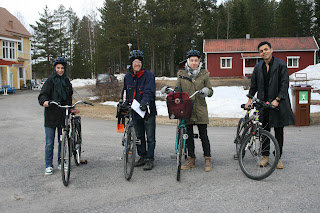The European Solidarity Corps
The Go(o)d Seed project is funded through the European Solidarity Corps and is a volunteer initiative to cultivate community, solidarity and peace in our city. Volunteers in our project join together in the life and community of our church (EFS church in Luleå) striving together to create a community of hospitality and compassion for all people. Our work is based on the life and teachings of Jesus and we want to communicate God´s love to everyone we meet.
The Go(o)d Seed Project includes three main themes of work:
1. Hospitality for people living on the margins of society,
2. Creation care through raising organic and locally grown food to serve at our meals.
3. Youth outreach through building relationships with teenagers in our youth group.
The Go(o)d Seed project is a Solidarity Corps Project funded by the European Union. For more information about the EU Solidarity Corps visit eusolidaritycorps.eupa.org.mt/ and in Swedish www.mucf.se/europeiskasolidaritetskaren
EFS Kyrkan in Luleå is lead organisation for the Go(o)d seed project. For more information about EFS Luleå visit www.efslulea.se
Learning goals
During the project we will consistently be referring to and using “Youthpass” as a tool and guide for learning. Youthpass has 8 Key Competences which volunteers are encouraged to develop in their volunteer activities. Volunteers in our project are directly working with many of these key competences such as: Multilingual competence, Personal, social and learning to learn competence, Citizenship competence, Cultural awareness and expression competence, Digital competence and Literacy competence. See more about these Key Competences here: https://www.youthpass.eu/en/help/faqs/keycompetences/.
As host and lead organisation we also have learning goals that we hope for you to achieve. These goals are:
-Volunteers will gain an awareness for the social and environmental injustices present in Luleå.
-Volunteers will be given tools and experience to know how to better interact and reach out to marginalized people in Luleå.
-Volunteers will gain leadership skills like how to plan and lead a topical group discussion, Bible study and group team building activities for youth.
-Volunteers will be trained in practical skills like: conflict resolution, sustainable gardening, food preparation and clean-up.
-Volunteers will be given time and space for both group reflection as well as personal reflection on their experiences in the project. Volunteers will be encouraged to search and discover their gifts, personal strengths and weaknesses. Volunteers will be encouraged to document their experiences and learning growth in a personal journal. The volunteer team will also document together their experiences in a team-journal, thus making it more possible to see how volunteers have achieved their goals and the projects goals as a whole.
We grow our own vegetables and raise our own food as a way to live locally and care for God´s creation. We plan to use the food that we grow in the meals that we serve. We want to see the number of meals served with our own vegetables increase. We also want to see an increased variety of recipes used that include our own vegetables. We plan to measure our success of this objective by keeping a record of how many meals that we serve that contain at least 50% of the total ingredients from our own garden, as well as a record of the different recipes used.
We want to create a community where youth feel safe and welcomed, a place to build friendships and a place to be mentored. We hope that this community can be a place of transformation through the love of Jesus. We hope that the youth involved in our youth group will be given the space and opportunity to find a deeper meaning to their life and to discover how each person has an important role to play in making the world a better place. We want to teach values like compassion, justice and earth care and to encourage youth to become active participants of society with the desire to create positive change in the world.
Even though it is impossible to measure the success of our work we hope that our youth ministry will create a lifelong formational impact. We do plan to measure these activities through recording the number of participants in our youth ministries as well as recording different ways that youth participants have taken on leadership roles and implemented what they have learned.






Comments
Post a Comment